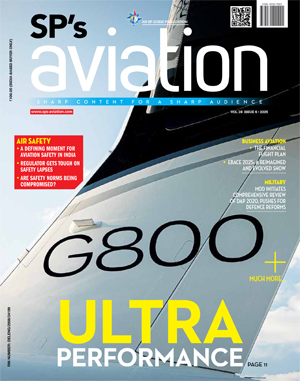INDIAN ARMED FORCES CHIEFS ON OUR RELENTLESS AND FOCUSED PUBLISHING EFFORTS

The insightful articles, inspiring narrations and analytical perspectives presented by the Editorial Team, establish an alluring connect with the reader. My compliments and best wishes to SP Guide Publications.

"Over the past 60 years, the growth of SP Guide Publications has mirrored the rising stature of Indian Navy. Its well-researched and informative magazines on Defence and Aerospace sector have served to shape an educated opinion of our military personnel, policy makers and the public alike. I wish SP's Publication team continued success, fair winds and following seas in all future endeavour!"

Since, its inception in 1964, SP Guide Publications has consistently demonstrated commitment to high-quality journalism in the aerospace and defence sectors, earning a well-deserved reputation as Asia's largest media house in this domain. I wish SP Guide Publications continued success in its pursuit of excellence.
- The layered Air Defence systems that worked superbly, the key element of Operation Sindoor
- Operation Sindoor | Day 2 DGMOs Briefing
- Operation Sindoor: Resolute yet Restrained
- India's Operation Sindoor Sends a Clear Message to Terror and the World – ‘ZERO TOLERANCE’
- Japan and India set forth a defence cooperation consultancy framework, talks on tank and jet engines
"Pilot Scarcity is Acute!"
In the backdrop of “Where is He?” SP’s Aviation interviewed Colonel Sanjay Julka (Retd) to find out the severity of this problem and the possible solutions. He was candid in his replies, “To address pilot scarcity in India, we need to revamp all regulations and bring them at par with world standard practices. Involve and encourage private players to open training schools and academies. Liberalise tax policies on training infrastructure and equipment import.”

SP’s Aviation (SP’s): Is the pilot scarcity more with business aviation (BA) and general aviation (GA) and less with the commercial airlines (scheduled operators)? Can you elaborate on this?
Colonel Sanjay Julka (Julka): Yes, scarcity is more in GA/BA because scheduled airlines have bigger planes and therefore is a preferred place. Also, the younger generation want to join airlines to pick up hours as airlines pilots fly at an average 125 hours, compared to 30 hours in GA/BA.
SP’s: What are the factors contributing to this kind of scarcity?
Julka: Growth in number of aircraft not supported by growth in number of pilots. Regulations archiac in nature and therefore training takes longer than normal. Bureaucratic delays in getting clearances. Regulatory and tax structure does not support opening up of ground or air training organisations in India.
SP’s: Can you indicate on as to how old the rule is, which forces the operators to opt for a pilot with 100 flying hours. Which in turn complicates the usage of a second type or a third type of aircraft but part of the fleet of the same operating company? Why is this continuing while as you say that there is no such restriction in the other countries?
Julka: The 100-hour rule is not followed by any country. I suppose it’s as old as the advent of simulators but this would need clarification.
INDIAN PILOTS IN GENERAL ARE SAFER THAN FOREIGN PILOTS MAINLY FROM SITUATIONAL AWARENESS POINT OF VIEW
SP’s: Even if we get a cream (top-end in terms of experience and endurance) out of foreign pilots’ fraternity, there are a few associated issues apart from the language-based issues? Can you elaborate them a little?
Julka: Accent of ATC personnel and foreign pilots.
SP’s: Isn’t there any technological solution to languagebased issues associated with a foreign pilot?
Julka: Yes, practice.
SP’s: Is the attrition rate of pilots high with non-scheduled operators/BA & GA? If so, why?
Julka: It is the same as I said in the beginning.
SP’s: In your view, how would one compare the foreign pilots versus Indian pilots specifically in terms of security and safety?
Julka: My views are endorsed by many. Indian pilots, in general, are relatively safer than foreign pilots mainly from ‘situational awareness’ point of view.
SP’s: What all solutions would you like to list down to address pilots’ concerns/scarcity?
Julka: Revamp all regulations and bring them at par with world standard practices. Involve and encourage private players to open training schools and academies. Liberalise tax policies on training infrastructure and equipment import.





